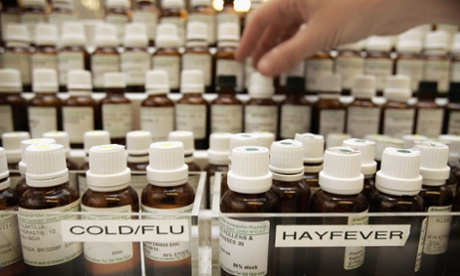
Sceptics consider homeopathy a joke, a bogus science that belongs in a punchline, not a pharmacy – but US government regulators are suddenly taking it seriously.
The US Food and Drug Administration (FDA) is holding public hearings this week to explore whether it should toughen oversight of what has become a controversial, billion-dollar branch of the healthcare industry.
Critics have long called for greater scrutiny and regulation of homeopathic remedies that make bold healing claims and and fill pharmacy shelves alongside conventional drugs.
“I hesitate to call these remedies ‘drugs’. They’re mostly sugar pills,” said Jim Underdown, the executive director of the Los Angeles branch of the Center for Inquiry, a nonprofit that advocates secularism and science, and made a presentation to the FDA panel on Monday. “People seem to think they actually have medicinal value, but all the science points to that not being true.”
The FDA invited consumers, patients, caregivers, healthcare professionals and industry groups, among others, to make oral and written submissions “about the current use of human drug and biological products labeled as homeopathic”, as well as the agency’s regulatory framework for such products.
The hearings, held in Silver Spring, Maryland, conclude on Tuesday. They offer a rare official forum for advocates and foes, and some who hold a halfway position, to argue over a fast-growing industry. In 2007, according to a Centers for Disease Control survey, 3.3 million Americans spent $2.9bn on homeopathic treatments.
Homeopathy, pioneered in the 18th century by German physician Samuel Hahnemann, operates on the basis that “like cures like” – that heavily diluted versions of substances which cause ailments can cure the same ailments.
Under current FDA enforcement policies, issued in a 1988 policy guide, homeopathic remedies can reach pharmacy shelves without official safety and efficacy evaluation.
The agency is now reviewing that policy in light of the “dramatic increase in the homeopathic product marketplace over the last 25 years”, it said in an emailed statement.
Another factor was concern about “significant safety issues” in recent years, including more than 130 reports of loss of sense of smell associated with the use of three over-the-counter cold remedies, and a warning about Hyland’s Teething Tablets because of inconsistent levels of belladonna.
A third reason, said the FDA statement, was availability of more scientific data. Studies in Australia, Britain and the United States have found little evidence that homeopathic remedies work.
In a submission on Monday, Adriane Fugh‐Berman, associate professor of pharmacology and physiology at Georgetown University medical center, said classical homeopathy, which seeks to match a patient’s ailment with a single, personalised remedy, should not be a regulatory concern.
However, most remedies were pre-mixed and sold over the counter to consumers who often confused them with dietary supplements and conventional medicine, she said. “The dangers of selling prescription drugs as homeopathic remedies are obvious. Allowing homeopathic remedies to sit side‐by‐side with conventional drugs that have undergone FDA scrutiny as over‐the‐counter drugs is inherently misleading.”
Luana Colloca, an associate professor in anaesthesiology at the University of Maryland, speaking to the Guardian after she addressed the panel, said she did not favour homeopathic remedies for serious diseases but said they “could be acceptable” for minor ailments, even if any benefit was “probably” just a placebo effect.
Colloca said lack of dialogue between the pro- and anti-homeopathy camps hindered patient awareness of best treatment options. “I think integration of the two systems could be very helpful for the patients.”
Homeopathy representatives defended their industry and the existing regulations, saying there was no need for a dramatic shakeup.
“Consumers most likely to buy homeopathic medicines are committed to their health and devote considerable research effort in evaluating healthcare choices,” said an American Association of Homeopathic Pharmacists submission.
“Consumers who have used homeopathic medicines highly trust their prescribing physician because of their personal experience, the safety profile, the low cost of the medicine and the consistent quality of homeopathic products,” said Lisa Amerine, of the Homeopathic Academy of Naturopathic Physicians.
Homeopaths around the US are following the hearings with apprehension, unsure if they will lead to onerous FDA regulations. “I am nervous,” said Avghi Constantinides, who runs the Los Angeles School of Homeopathy, which offers a three-year course.
She defended the safety and efficacy of trained homeopathic treatment, but lamented that “weekend warriors” with little training and dodgy certificates were tainting the industry. “Some people do a weekend course and call themselves homeopaths. It’s very frustrating.”

